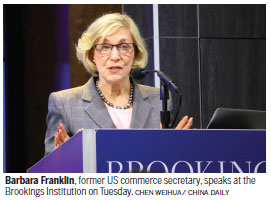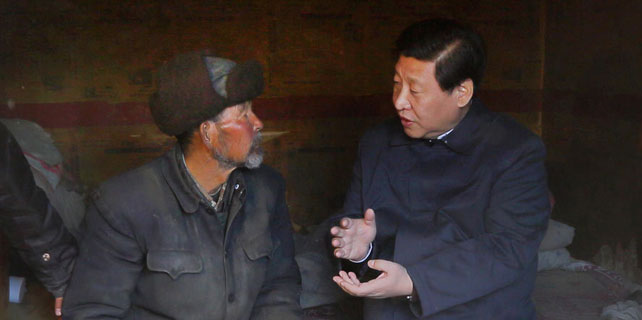Cui: China doesn't want a trade war
China opposes any trade war with the US, which it sees as detrimental to both sides, according to Cui Tiankai, Chinese ambassador to the United States.
Speculation about a possible economic conflict between the world's two largest economies has been rife, given US President Donald Trump's blunt campaign rhetoric on trade with China, such as calling it a currency manipulator and imposing a 45 percent tariff on imports.
"It (trade war) will only cause destruction to both sides and neither will benefit from it," Cui said on Tuesday evening. "It will inflict even more damage to the global economy."
Cui spoke to reporters on the sidelines of a reception at the Chinese embassy in Washington to mark the upcoming Lunar New Year.

Instead of clashing on trade, Cui said it is an unshirkable responsibility for China and the US to help inject new momentum into global economic growth.
Citing China as the world's largest single market, Cui said that if the US wants to have a bigger slice of the Chinese market and benefit more from it, it should work with China for a more strong and stable China-US economic and trade relationship.
On the same day, former US secretary of commerce Barbara Franklin dismissed a trade war between the two countries.
"A trade war, as some are predicting, harms both countries, creates uncertainties for many other countries, and is an activity that has no place anywhere in the interconnected global world of the 21st century," Franklin told a large crowd at the Brookings Institution in Washington on Tuesday.
"So I think that this is not going to happen. I think it will be averted," said Franklin, who was in the Cabinet of former president George H.W. Bush.

"Instead, I must believe that these two leaders are pragmatic, that they understand the stakes and the need to continue a stable relationship," she said of President Xi Jinping and Trump.
In 1992, Franklin was sent by Bush to China to normalize the commercial relationship, a relationship that suffered a major setback in the previous three years.
Franklin emphasized that it's important for the two countries to engage with each other, citing dialogue such as the Strategic and Economic Dialogue (S&ED) and the Joint Commission on Commerce and Trade (JCCT).
"These or something similar should be continued even if the new administration wants to restructure them," said Franklin, who now advises companies on their global business, especially in China and Asia.
In her view, the dialogue provides a serious and regular way for the two countries to talk together, identify problems and work to find common ground to overcome them.
She said there must be leadership from the top. "The tone and priorities (for the dialogue) must come from the two leaders," she said.
"I am hopeful that the two of them meet and talk regularly and will establish a personal relationship," she said, adding that an introductory phone call on Nov 13 between the two was cordial.
Franklin is hopeful that the two leaders will look for ways
and issues on which they can work together for the good of both countries as well as the global economy.
"And where there are disagreements - we know already we have some disagreements - I am hoping they will look for common ground to begin to find solutions," she said.
Franklin suggested that China address issues such as market access, tariff and non-tariff barriers, overcapacity and state-owned enterprises in what she expects will be a rebalancing of the US-China trade relationship by the Trump administration.
"I believe everyone ought to take seriously the determination for change that I've seen coming out of the president and so far this administration," she said.
Stapleton Roy, US ambassador to China from 1991 to 1995, said Franklin was right in suggesting that the trade issues between the US and China shouldn't lead to confrontation.
"I think she held out the possibility of a good outcome, and I think that's a good way to think about the issues between China and the United States," Roy said.
Richard McGregor, a former Washington bureau chief for the Financial Times of London and a longtime China observer, also excluded the possibility of a trade war, saying that such a scenario is a de facto trade war with Asia, implying that China's economy is so closely linked with other Asian economies.
David Lampton, director of China Studies at the Johns Hopkins University School of Advanced International Studies, said Franklin is right. But he said he is a bit more worried than she is.
Lampton is concerned about possible trade retaliation. "I think if we do get into trade retaliation, it's lose-lose for both countries," he said. "We will see increasing trade frictions for a while until each side makes accommodation with the other."
chenweihua@chinadailyusa.com
(China Daily USA 01/25/2017 page1)
















